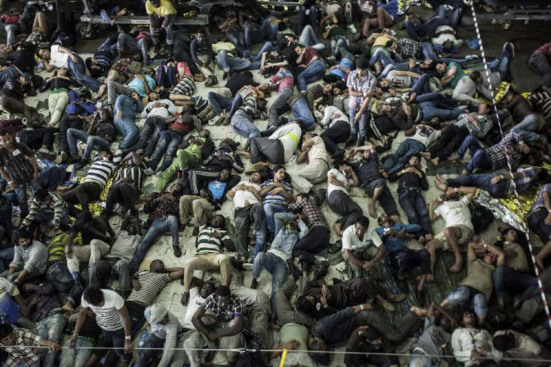The United Nations human rights expert on migrants on 30 October 2014urged British authorities to reconsider a decision not to support search and rescue operations in the Mediterranean Sea, saying allowing people to die at Europe’s borders just because of their administrative status “is appalling.”
The UN Special Rapporteur on the human rights of migrants, François Crépeau, said in a press release issued in Geneva on 30 October 2014 that “governments that do not support the search and rescue efforts have reduced themselves to the same level as the smugglers.”*
“They are preying on the precariousness of the migrants and asylum seekers, robbing them of their dignity and playing with their lives,” Crépeau said.
UK Will Not Support Any Future Search and Rescue Operations
The United Kingdom this week announced that it will not support any future search and rescue operations to prevent migrants and refugees drowning in the Mediterranean Sea, stating that such operations can encourage more people to attempt the dangerous crossing to enter Europe.
“Migrants are human beings and just like the rest of us they too have rights. They too have the right to live and thrive,” Mr. Crépeau said. “To bank on the rise in the number of dead migrants to act as deterrence for future migrants and asylum seekers is appalling.”
“It’s like saying, let them die because this is a good deterrence,” said.
Italian coastguard vessels arrive at Lampedusa Island after rescuing people on the Mediterranean. (January 2012) Photo: UNHCR/F. Noy
More than 130,000 migrants and asylum seekers are estimated to have arrived in Europe by sea so far this year, compared with 80,000 last year. More than 800 people have died in the Mediterranean so far this year.
“Despite good initiatives like the increase in search and rescue operations which have saved many lives, the emphasis remains on restricting the entry of migrants rather than on creating new legal channels for migration,” the press release said.
“Sealing international borders is impossible, and migrants will continue arriving despite all efforts to stop them, at a terrible cost in lives and suffering,” the Special Rapporteur said repeating his message on border management in an open letter he sent to the European Union last month.
He cautioned that the absence of regulated open migration channels for much-needed low-wage migrants drives migration further underground, increases the precariousness of their situation, and entrenches smuggling mafias and exploitative employers, resulting in more deaths at sea and more human rights violations.
Photo: UNHCR/M. Sibiloni
“It is paradoxical that, in the name of securing borders, European States are actually losing control over their borders, as mafias will often be ahead of that game. Moreover, the increasing number of persons fleeing from conflict, violence and oppression requires a new and concerted strategic approach by European States towards asylum seekers,” he said.
He also said that search and rescue programmes cannot be the sole responsibility of the frontline countries and appealed “for more concerted efforts by EU Member States to assist frontline countries such as Italy, Malta, Greece and Spain.”
Crépeau was appointed Special Rapporteur on the human rights of migrants in 2011 by the UN Human Rights Council. As Special Rapporteur, he is independent from any Government or organization and serves in his individual capacity.
He has undertaken a one-year study to examine the rights of migrants in the Euro-Mediterranean region, focusing in particular on the management of the external borders of the European Union. (*Source: UN Release).
Read also:
Two Main Routes of Smuggling of Migrants Generate $7 Billion a Year to Criminal Groups
With Annual $36 Billion, Human Trafficking Ranks as World’s Third Most Profitable Crime
2.4 Million Victims of Human Trafficking At Any Given Time Across the Globe
Who Dares to Challenge a 32 Billion Dollars Business – Human Trafficking?
Rescuing Migrants in the Sea — Tunisian Fishermen Unlikely Heroes
UN Concerned over Spain’s Bid to Legalize Push-backs of Migrants
2014 Human Wrongs Watch












